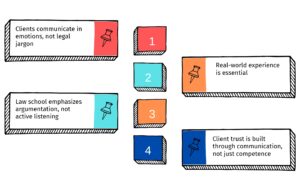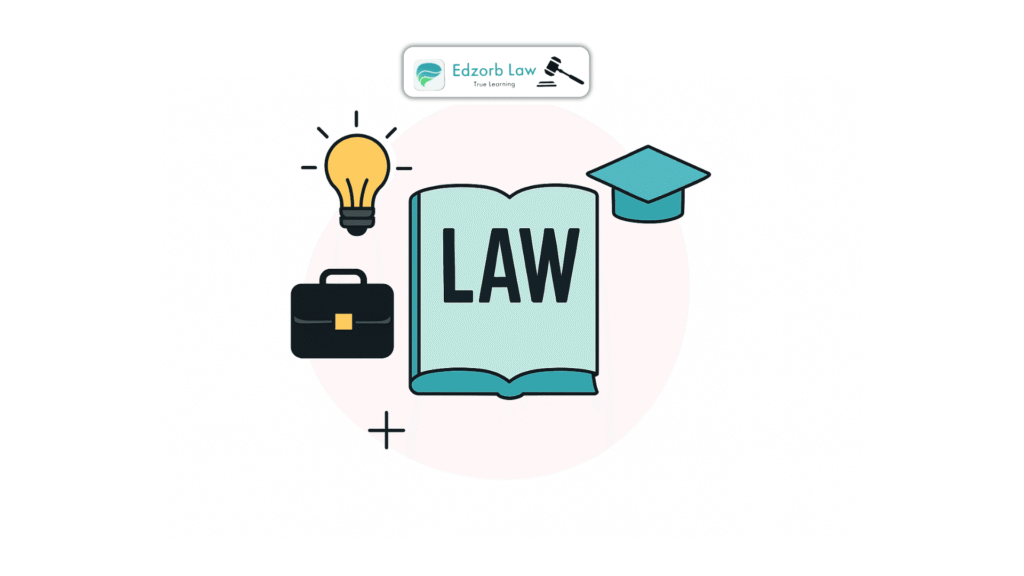Law school equips you with case laws, statutes, and courtroom etiquette, but real-world law practice? That’s a whole other game. The gap between legal theory and practical lawyering is real and often overwhelming.
🎯 In this blog, we uncover 7 crucial things law schools should teach but don’t; and why mastering them early can give you a massive edge.
1. Client Management is a Skill And You’re Not Born With It

Understanding Client Psychology
-
Clients don’t speak “legalese”, they speak emotion, urgency, and money.
-
Law school teaches how to argue a case, but not how to listen to a worried client or manage expectations.
Real-World Tip:
Start shadowing senior lawyers or intern at legal aid clinics to understand real client interactions.
2. Legal Research Tools Beyond Bare Acts and Books
Law School Research = Books
-
Tools like Manupatra, SCC Online, Westlaw, LexisNexis dominate real-world legal research.
-
Advanced search techniques, filters, and case brief tools can save hours.
🛠️ Edzorb Pro Tip:
Learn AI-powered legal research tools early, some even help with case summarization and precedent extraction.
3. Billing, Invoicing & Legal Entrepreneurship
You’re Not Just a Lawyer; You’re a Service Provider
-
Law schools rarely talk about client acquisition, retainer models, or billing hours.
-
Whether you freelance or start your own firm, knowing how to price your services is crucial.
📊 Basics to Master:
-
Drafting invoices
-
Time tracking software (ex: Toggl, Clio)
-
Negotiation skills for retainer contracts
4. Drafting Is Not Just About Language, It’s About Precision
What You Face: Complex Contracts, Petitions, Notices
-
Real drafting demands attention to detail, risk mitigation, and foresight.
-
A single misplaced word can change the meaning of a clause.
✍️ Practice Areas to Focus On:
-
Contract Drafting
-
Property Agreements
-
Criminal Complaints & Bail Applications
5. Law Is Also About Networking, Not Just Merit

The Harsh Truth: “Who you know” often opens more doors than “what you know.”
-
From landing internships to getting cases or clients, your professional network is everything.
-
Law school rarely emphasizes LinkedIn optimization, bar events, or alumni outreach.
🤝 Start With:
-
Joining legal forums
-
Attending moot courts, seminars, webinars
-
Connecting with peers, seniors, and mentors consistently
6. The Emotional Side of Lawyering: Burnout, Pressure & Balance
Mental Health Isn’t a Topic in Law Syllabi
-
Law is high-pressure, especially in litigation and corporate practice.
-
Emotional detachment, client stress, late nights, all can lead to burnout.
💬 What Helps:
-
Mindfulness practices
-
Legal peer support groups
-
Setting boundaries with clients and workload
7. Laws Keep Changing, Lifelong Learning is Non-Negotiable

You Can’t Rely Only on What You Learned in College
-
From criminal law reforms to new constitutional interpretations, laws evolve fast.
-
Law school exams end, but real-world law exams are daily.
🎓 Pro Tip:
-
Subscribe to legal update newsletters
-
Use Edzorb’s Visual Learning Notes and Flashcards to stay sharp
-
Follow SC judgments, legal YouTube channels, and expert blogs weekly
Conclusion: Law School is the Start, Not the End
Being a great lawyer isn’t just about scoring in exams, it’s about balancing legal skill, emotional intelligence, client service, and adaptability.
🎯 Your Action Plan:
-
Pick 1 skill from this list today and start learning it practically.
-
Small daily practice will make you a lawyer who’s not just qualified; but ready for the real world.
🚀 Ready to Bridge the Gap?
🎓 Dive into Edzorb Law Real-Life Law Modules, binge-worthy content with Mock Tests, Case Law Analysis, and Visual Learning Notes to prep you for the actual practice of law

 Podcast
Podcast





 Features
Features






